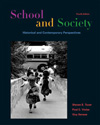| The few selected events in this table help situate the discussion
of education in Athens among cultural events that may already be familiar
to you. Each of these events provides a clue about the cultural practices
and institutions (political economy) and/or the beliefs and values (ideology)
of classical Athens. As this chapter shows, education in Athens would reflect
the culture's practices, beliefs, and values. |
Before the Classical Athenian Era |
| 800 B.C. | Homer writes the first epic poems, including the Iliad and
the Odyssey |
| 800 | Sparta and other Greek city?states established |
| 776 | Olympic games
begin |
| 750 | Greeks adapt alphabet for writing |
| 594 | Solon establishes government
reforms that lay basis for Athenian democracy by property owners; serfdom
is abolished |
Classical Athens |
| 508 | Athenian democracy extended to all Athenian freemen rather
than only landed aristocrats |
| 496 | The playwright Sophocles is born |
| 484 | The historian Herodotus is born |
| 469 | Socrates, philosopher and teacher of Plato, is born |
| 450 | The age of Pericles begins and will last until 429 B.C. |
| 450 | The Greek war against Persia ends |
| 447 | The Parthenon
and other buildings are erected on the Acropolis |
| 428 | Plato, student of Socrates and founder of European philosophy,
is born |
| 411 | An oligarchic regime briefly rules Athens, followed by Spartan
rule |
| 403 | Athenian democracy is restored |
| 387 | Plato
founds Academy at Athens |
| 384 | Plato's student Aristotle is born |
| 335 | Lyceum,
Aristotle's school, is opened |
| 334-324 | Aristotle's student Alexander the Great conquers vast empire,
including parts of Asia and Africa |



 2002 McGraw-Hill Higher Education
2002 McGraw-Hill Higher Education